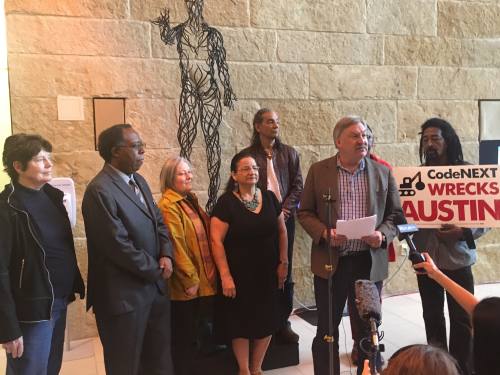After a group of citizens sued the City of Austin, claiming city council suppressed the citizenry’s voting rights over a proposed land development code rewrite, the two sides have been scheduled to see the judge in three weeks.
The parties will meet in front of Travis County District Judge Orlinda Naranjo on Wednesday, June 27, at 9 a.m., according to local attorney Fred Lewis.
Lewis, a leader of the anti-CodeNEXT group Community Not Commodity that helped push the petition, along with Save Our Springs Alliance attorney Bill Bunch, will represent the group of citizens bringing the suit against the city. Those citizens include vocal CodeNEXT opponents such as Jeff Jack, president of the Austin Neighborhoods Council; Mary Ingle, the neighborhood group’s former president; and Nelson Linder, president of the Austin chapter of the National Association for the Advancement of Colored People.
At the center of the lawsuit is CodeNEXT, the city’s five-year and $8.5 million project to rewrite its land development code—a response to the city’s exponential growth. Location of housing density has dominated the debate and drawn sharp political lines between those who wish to shield existing neighborhood character from added housing and those who support abundant housing everywhere. After several drafts, the project is now in front of city council, indicating the home stretch.
In March, the city received a petition with what would be 26,000 valid signatures from Austinites demanding the city pass an ordinance to give residents voting power on CodeNEXT and any future comprehensive rewrite of the land development code—a citizen-initiated ordinance.
Third-party legal advice told city council zoning laws are generally out of scope for citizen-initiated ordinances, so they voted 6-4 in April against adopting the ordinance.
In many cases, council voting against adopting a citizen-initiated ordinance would trigger a referendum on the ordinance. However, City Council voted 6-4 in May against putting the question about the ordinance on the November ballot. They will now have to defend that decision in district court.





